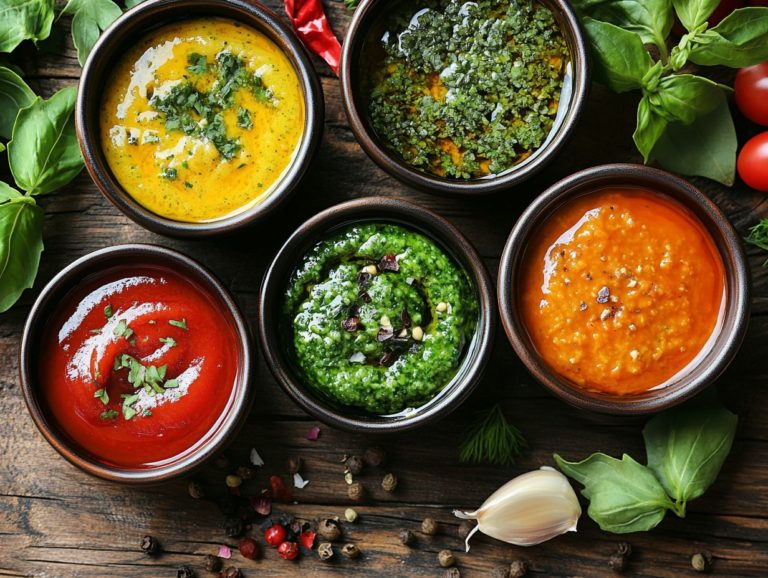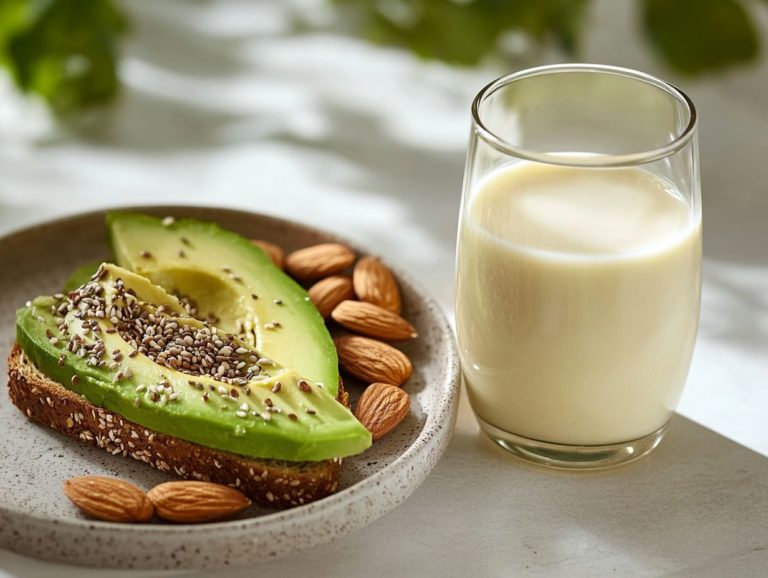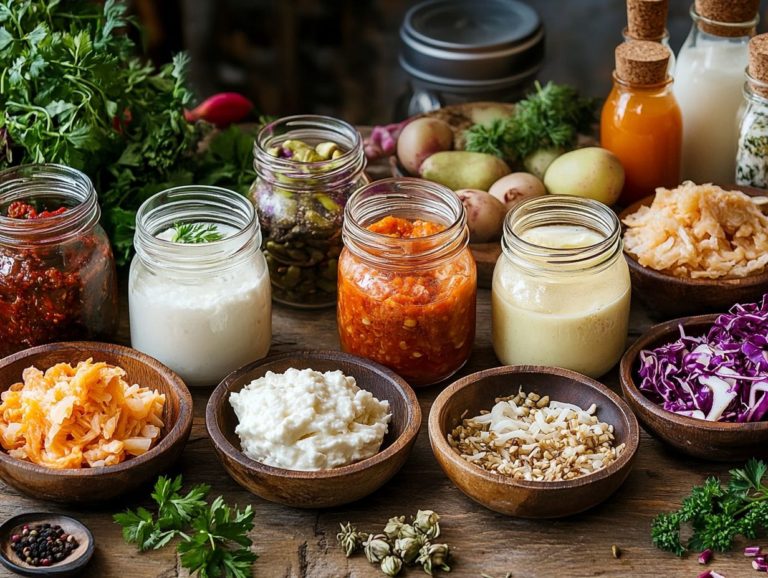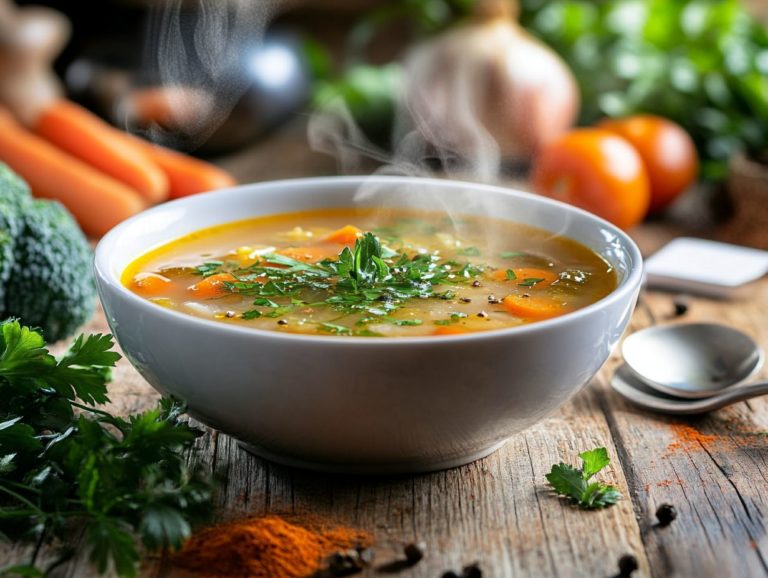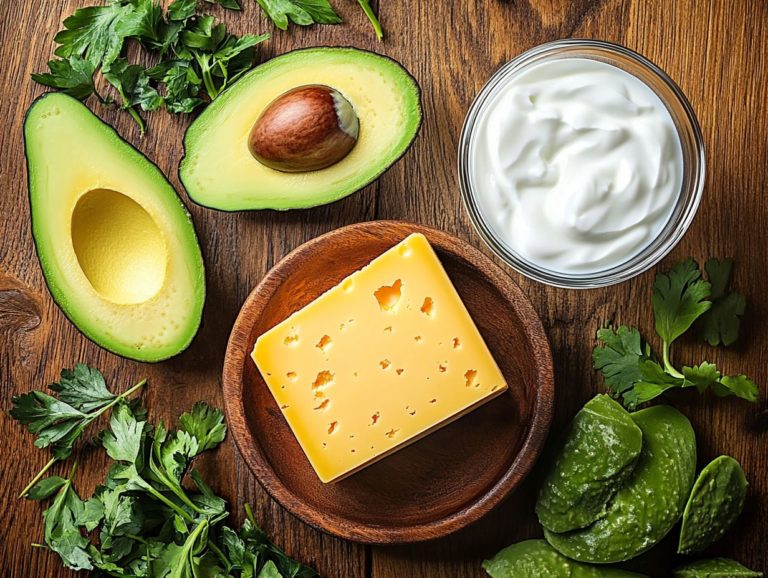Understanding Fats: Essential for Keto
Fats often find themselves on the receiving end of negative perceptions, yet they are indispensable in your dietary repertoire, particularly if you are embracing a ketogenic lifestyle. This article delves into the essence of fats, exploring their various types from saturated fat to polyunsaturated fat and highlighting why they are essential for thriving on a keto diet.
You will uncover the myriad benefits of fats and discover the finest sources of healthy options, equipping you to seamlessly integrate them into your meals. It will also address potential risks and provide tips for optimizing your fat intake.
Get ready to discover how crucial fats are for your keto success! This includes understanding the importance of calories, protein, and carbohydrates, and how they interact with fats in your diet.
Contents
- Exploring the Benefits and Healthy Fats of the Keto Diet
- What Are the Best Sources of Healthy Fats for Keto?
- How Much Fat Should You Eat on a Keto Diet?
- Are There Any Risks of Eating Too Much Fat on Keto?
- How Can You Incorporate More Healthy Fats into Your Keto Diet?
- Healthy Fats for Your Keto Journey
- Frequently Asked Questions
- What are fats and why are they essential for a keto diet?
- How do fats fit into a keto diet?
- What types of fats are allowed on a keto diet?
- Can I eat unlimited amounts of fats on a keto diet?
- What are the benefits of adding healthy fats to my diet?
- Are all fats created equal?
Key Takeaways:
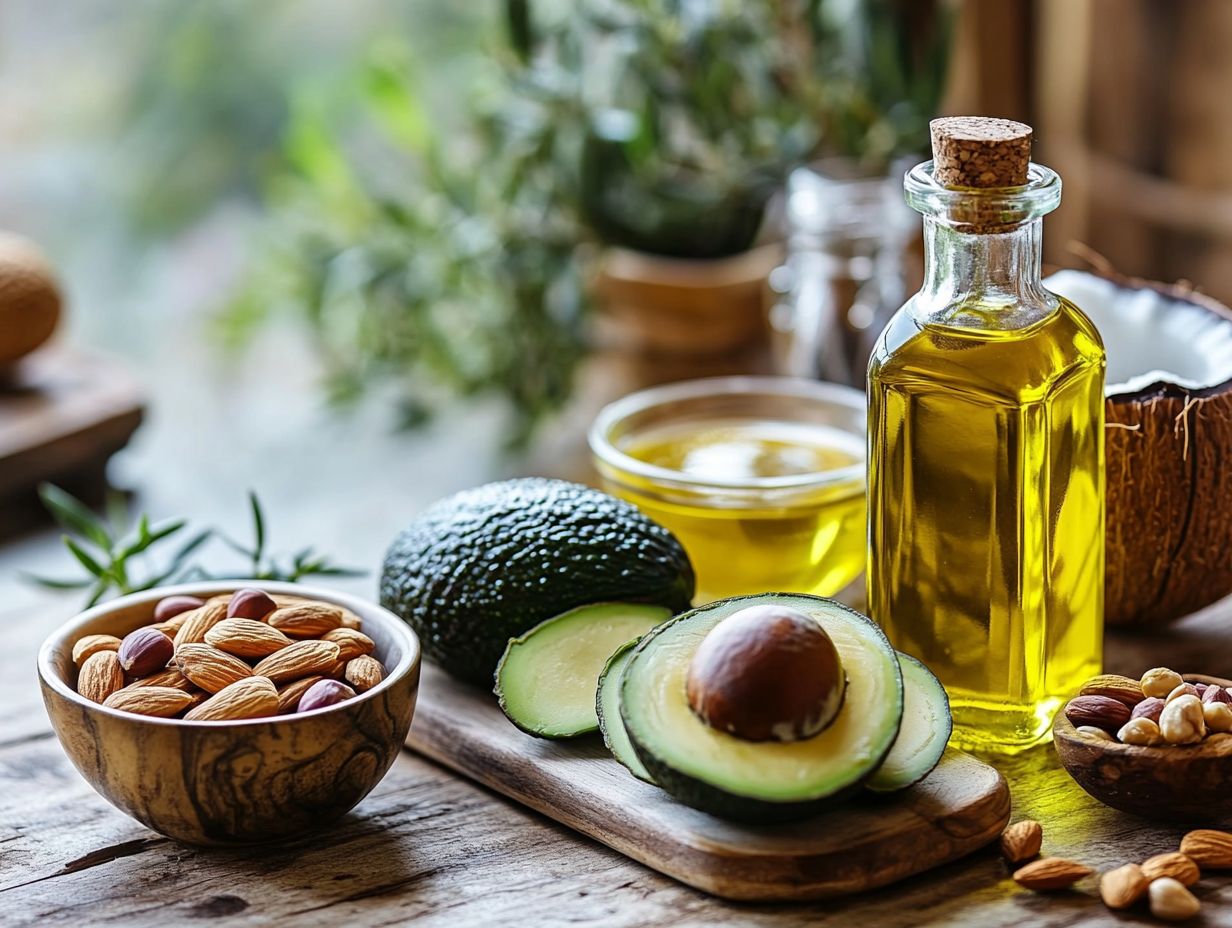
- Understanding the different types of fats is crucial for a successful keto diet.
- Healthy fats, like avocado, coconut oil, and fatty fish, are essential for providing energy and aiding in weight loss on a keto diet.
- Incorporating healthy fats into your meals and snacks, like avocados and nuts, and being mindful of portion sizes, is key to maintaining a balanced and effective keto diet.
What Are Fats?
Fats hold a vital place in your diet and overall health. They serve as a crucial energy source and a key component of cellular structure. Fats come in various forms, including saturated fat, monounsaturated fat, polyunsaturated fat, and trans fat. Each type plays an essential role in metabolism and the absorption of fat-soluble vitamins.
Fats like Omega-6 and Omega-3 fatty acids are critical in managing inflammation and promoting heart health. It’s important for you to understand the distinctions between these types of fats, particularly Omega-6 and Omega-3 fatty acids. They can significantly affect your cholesterol levels and your risk of heart disease.
Despite the negative reputation they often carry, healthy fats are critical for maintaining inflammation and hormonal balance in your body. They provide the energy and nutrients you need for optimal health.
What Are the Different Types of Fats?
You will encounter several types of fats, each with distinct characteristics and health implications: saturated fat, monounsaturated fat, polyunsaturated fat, and trans fat. Understanding these differences is essential for making informed dietary choices, particularly when it comes to managing calories and maintaining a healthy metabolism.
Saturated fats are typically solid at room temperature. While they can provide energy, overindulging may elevate the bad type of cholesterol, potentially contributing to heart disease. On the other hand, monounsaturated fats tend to be liquid and can actually help lower harmful cholesterol levels, thereby promoting cardiovascular health.
Polyunsaturated fats encompass both Omega-6 and Omega-3 fatty acids, which are crucial for brain function and cell growth. Omega-6, often found in oils like corn and soybean, plays a vital role in managing inflammation. However, consuming too much common in many Western diets can lead to imbalances that may promote chronic diseases.
In contrast, Omega-3 fatty acids, which are abundant in fatty fish and flaxseeds, are celebrated for their anti-inflammatory properties and numerous benefits for heart health.
As for trans fats, typically lurking in fried and baked goods, they present significant health risks. Nutritionists and the American Heart Association strongly recommend their complete elimination from your diet.
Why Are Fats Essential for Keto?
Fats are absolutely essential for the Keto diet, acting as your primary source of energy and helping your body enter ketosis a state where your body burns fat for fuel instead of carbohydrates.
By embracing this high-fat, low-carb approach, you re not just changing your meal plan; you re shifting your metabolism to prioritize fat as its main energy source. This shift can lead to remarkable health benefits, including improved cholesterol levels and enhanced weight loss. Utilizing a macro tracker can help you keep tabs on your fat, protein, and carbohydrate intake to optimize your results.
The ketogenic diet encourages you to consume healthy fats, which not only support your overall well-being but also provide essential fatty acids and help you feel satisfied and satiated.
How Does Fat Fit into a Keto Diet?
In the realm of a Keto diet, fats transcend mere necessity; they are the very cornerstone of the entire dietary structure, delivering energy and helping your body maintain ketosis. Fats also assist in managing insulin levels, making it easier for your body to enter and sustain ketosis.
This low-carb approach demands an elevated intake of healthy fats, enabling your body to transition smoothly to using fat rather than carbohydrates for energy production.
By embracing fats like avocado, olive oil, and fatty fish, and incorporating foods like bacon and butter into your diet, you set the stage for a host of health benefits. These include enhanced weight management and improved metabolic efficiency all while enjoying a diet that’s both flavorful and diverse.
What Is the Keto Diet?
The Keto diet, or ketogenic diet, is a low-carb, high-fat approach designed to transform your body’s metabolism into a state of ketosis. In this state, your body shifts gears, using fat for energy instead of carbohydrates. By drastically cutting down on carbs and ramping up fat intake, the Keto diet encourages your body to burn stored fat, leading to potential benefits like weight loss and increased energy levels.
This exciting dietary model focuses on delicious whole foods and healthy fat sources, making it a popular choice for those looking to shed pounds and enhance overall health and metabolic function. Notable nutritionists like Scott Keatley and Kayli Anderson often recommend this approach for its sustainable and long-term health benefits.
In this biochemical dance, when carbohydrates are in short supply, your liver steps up, converting fats into ketones, which serve as an alternative energy source. Ketosis is when your body starts burning fat instead of carbs for energy. This metabolic shift can help stabilize blood sugar levels and curb cravings, making it particularly advantageous for those managing diabetes or metabolic syndrome.
You ll find yourself enjoying a variety of foods on the Keto diet, such as avocados, nuts, seeds, olive oil, and fatty fish. These foods not only provide essential nutrients but also ensure you re getting enough healthy fats.
Ultimately, focusing on healthy fats instead of unhealthy ones is vital. This choice promotes heart health and overall wellness, reinforcing the diet’s effectiveness and sustainability in the long run. Consulting food labels and being aware of the smoke point of fats like vegetable oils can further optimize your dietary choices.
Start your keto journey today and discover how delicious healthy fats can be!
Exploring the Benefits and Healthy Fats of the Keto Diet
What Are the Benefits of a Keto Diet?
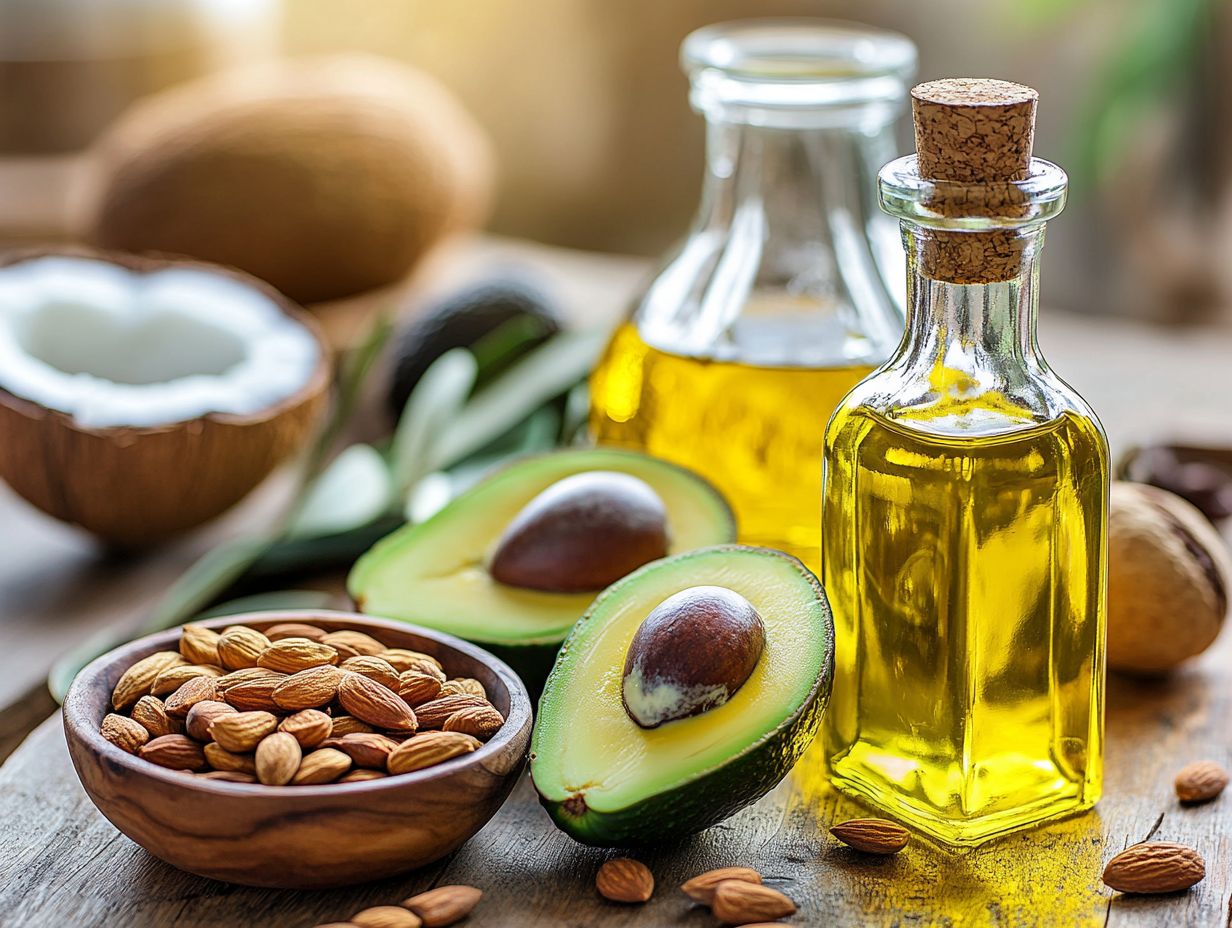
The Keto diet presents a wealth of benefits, particularly when it comes to weight loss and improved metabolic health. By promoting the efficient use of fat for energy and reducing your reliance on carbohydrates, you might find yourself experiencing considerable reductions in appetite. This often results in eating fewer calories without even trying! It can lead to more effective weight management.
The diet can also improve cholesterol levels, reduce inflammation, and enhance energy production, making it an appealing option for those who wish to elevate their overall health while savoring satisfying, high-fat meals. Nutrition experts like Jessica Migala suggest that this approach can also aid in better managing insulin resistance and metabolic syndrome (a condition where the body has trouble using insulin effectively).
This dietary strategy not only accelerates fat burning, fostering weight loss but also contributes to enhancing your cholesterol profile. Research indicates that sticking to the Keto plan can elevate your levels of HDL (the “good” cholesterol) while simultaneously lowering triglycerides. This combination supports heart health. By minimizing inflammation, often associated with chronic diseases, the Keto diet acts as a protective measure for your overall well-being.
Another compelling advantage is the boost in energy you may experience as your body becomes more efficient at utilizing fat. This can lead to sustained energy levels throughout the day. Experts suggest that this metabolic shift may also enhance your physical performance and clarity of thought. Don t waste any time start enjoying the incredible benefits of healthy fats today!
What Are the Best Sources of Healthy Fats for Keto?
Incorporating the finest sources of healthy fats is essential for your success on the Keto diet. These fats not only provide energy but also deliver vital nutrients that support your overall well-being.
Consider embracing avocados, celebrated for their rich monounsaturated fats, and olive oil, renowned for its heart-healthy properties. A delightful array of nuts and seeds offers a perfect balance of fats, protein, and fiber, enhancing both your meals and your health. Including eggs and fatty cuts of meat can also provide additional sources of healthy fats.
Don t overlook fatty fish like salmon and mackerel; they are outstanding sources of Omega-3 fatty acids, which contribute to heart health and help reduce inflammation.
1. Avocado
Avocado truly shines as a premier source of healthy fats for your Keto diet, brimming with monounsaturated fats that not only promote heart health but also deliver essential nutrients. You ll appreciate their high fiber content and low carbohydrates, making them the perfect choice for maintaining ketosis while indulging in a creamy, flavorful addition to your meals.
Whether you slice them into a salad, blend them into smoothies, or use them as a spread, avocados are incredibly versatile and can seamlessly elevate a variety of dishes. Pairing them with other high-fat foods like bacon or using them in meal planning can maximize their nutritional benefits.
Incorporating avocados into your meal planning not only enhances flavor but also enriches your diet with vital vitamins such as E, K, and several B vitamins, all crucial for your overall wellness. For those embracing a high-fat lifestyle, avocados serve as a delightful foundation for Keto-friendly recipes, like egg-filled avocado boats or a rich topping on zoodles.
They can even be blended into creamy dressings or dips, introducing texture and healthy fats without the added sugars found in many other sauces. With their numerous health benefits, avocados are a must-have in your Keto meal prep routine, making them an essential ingredient for anyone on the Keto diet.
2. Coconut Oil
Coconut oil is an exceptional source of healthy fats for your Keto diet. It is primarily made up of medium-chain triglycerides (MCTs), a type of fat that your body quickly uses for energy. This unique fatty acid profile helps maintain ketosis and may enhance your cognitive function while promoting fat loss.
Coconut oil has a high smoke point, making it perfect for cooking at high temperatures. It shines in a variety of recipes, from baking and saut ing to blending seamlessly into smoothies for added creaminess and flavor. Its versatility makes it an essential ingredient in your kitchen.
Incorporating coconut oil into your daily meals is simple. Imagine elevating basic dishes like scrambled eggs with flavor and a nutritional boost. It also serves as a wonderful base for salad dressings or a fantastic substitute for butter in many baking recipes.
If you need a quick energy lift, mix a tablespoon of coconut oil into your coffee or tea. This creates a frothy, satisfying beverage that helps keep you feeling full.
Whether spread on toast or blended into desserts, the benefits of coconut oil extend beyond satisfying hunger. It actively supports your body s transition into ketosis and fuels an energetic lifestyle.
3. Olive Oil
Olive oil is celebrated for its impressive health benefits and serves as an exceptional source of healthy fats, making it a perfect fit for the Keto diet. Its high content of monounsaturated fats and antioxidants positions it as a powerhouse for your wellness. Regularly incorporating olive oil into your meals can lead to improved heart health, reduced inflammation, and an overall boost in well-being.
Its versatility in flavor allows it to shine in salad dressings, as a drizzle over vegetables, or as a cooking oil for low-heat preparations. This makes it an essential component of your Keto meal planning.
Integrating olive oil into your diet is effortless. Consider it the foundation for marinades or the finishing touch on heartier dishes. Beyond simply dressing salads, it enhances the flavor of grilled meats and roasted seafood, imparting a rich taste that beautifully complements the natural ingredients.
The healthy fats in olive oil contribute to feelings of fullness, helping you maintain your energy levels throughout the day. The antioxidants in olive oil combat oxidative stress, further enhancing heart health and overall vitality. Nutrition experts like Jessica Migala highlight these benefits when discussing how to integrate olive oil into a well-rounded diet.
With such a wide array of culinary possibilities, it’s clear why olive oil is a kitchen essential that everyone should have!
4. Nuts and Seeds
Nuts and seeds make delightful snacks that are also packed with nutrients. They provide healthy fat, protein, and fiber. Varieties like almonds, walnuts, chia seeds, and flaxseeds offer essential nutrients, including Omega-3 and Omega-6 fatty acids, which help you maintain satiety and manage your weight.
Incorporating these foods into your meals whether in salads, smoothies, or as toppings enhances both flavor and nutritional quality. This supports your low-carb lifestyle.
Including these nutrient-dense foods in your daily meals positively impacts your heart health. They help lower cholesterol levels due to their rich omega-3 and omega-6 fatty acid content. For a Keto-friendly snack, enjoy a handful of mixed nuts or sprinkle seeds over Greek yogurt for added crunch and creaminess.
Roasted nuts serve as an ideal savory snack, while nut butters can elevate smoothies or low-carb desserts into indulgent yet satisfying options. Even the simplest meal can feel like a luxurious experience while still being healthful.
5. Fatty Fish
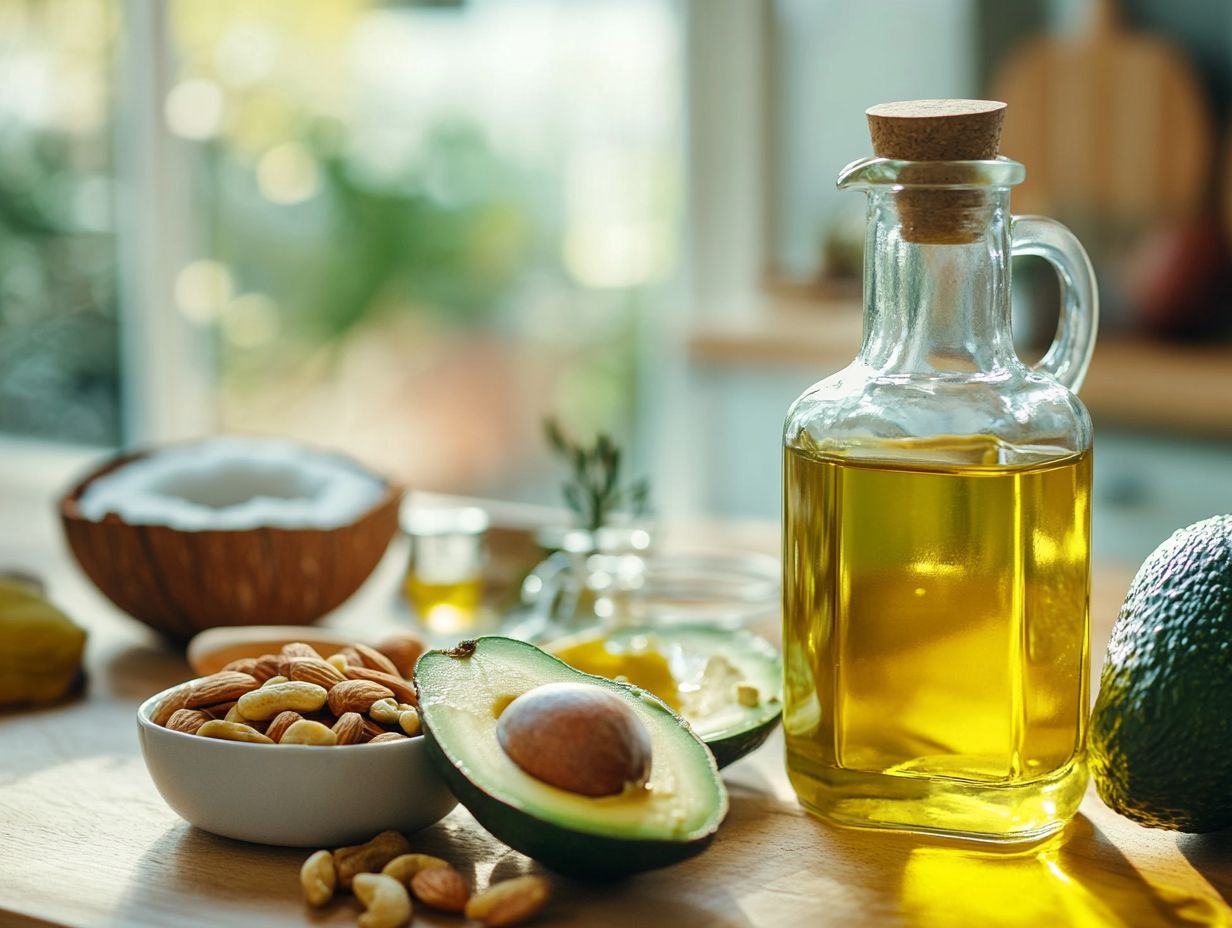
Fatty fish like salmon, mackerel, and sardines are exceptional sources of healthy fats for your Keto diet, delivering a generous dose of Omega-3 fatty acids that are vital for heart health and reducing inflammation. These fish provide high-quality protein and enrich your diet, supporting your overall well-being. Experts like Kendra Whitmire and Scott Keatley often recommend including such nutrient-rich options in a balanced diet.
By incorporating fatty fish into your meals a few times a week, you can enhance flavor while deliciously meeting your fat intake goals and reaping the numerous health benefits they provide.
To maximize the advantages of these nutrient-rich options, explore various preparation methods that highlight their natural flavor. Grilling or baking them with fragrant herbs like dill and rosemary can elevate your dish while maintaining its Keto-friendly status. For instance, Kayli Anderson suggests pairing these methods with wholesome ingredients for a balanced and flavorful meal.
Pairing these fish with low-carb vegetables such as asparagus or zucchini boosts the meal s nutritional profile and adds vibrant colors to your plate. If you’re craving comfort food, a creamy fish stew with coconut milk offers a wholesome, satisfying option that aligns perfectly with your Keto lifestyle, making it effortless to enjoy these heart-healthy choices regularly.
How Much Fat Should You Eat on a Keto Diet?
Determining the right amount of fat to incorporate into your Keto diet is pivotal for successfully entering and sustaining ketosis. Typically, you’ll want around 70-80% of your total daily calories to come from fats, though this may vary based on your individual energy requirements.
This substantial intake of fat fuels your body s shift in metabolism away from carbohydrates, allowing it to efficiently harness fat as its primary source of energy.
Grasping the importance of macronutrient ratios is essential for effective meal planning, ensuring that the fat sources you choose are of the highest quality to optimize your health benefits.
Are There Any Risks of Eating Too Much Fat on Keto?
While the Keto diet champions a high fat intake, it’s crucial to recognize the potential risks tied to consuming excessive amounts of fat, especially saturated fats. These can adversely affect your cholesterol levels and elevate your risk of heart disease.
As you embrace this diet, directing your attention towards healthy fat sources and maintaining a balanced intake is vital to avoid any negative health repercussions. Regularly monitoring your cholesterol levels and overall health can significantly mitigate these risks, paving the way for a successful and sustainable Keto journey.
How Can You Incorporate More Healthy Fats into Your Keto Diet?
Adding healthy fats to your Keto diet is an exciting adventure! Start with intentional meal planning and cooking techniques that celebrate high-fat, low-carb ingredients.
Consider making simple yet impactful changes, such as drizzling olive oil over your salads, blending avocado into your smoothies, or enjoying a handful of nuts as a snack these adjustments can significantly elevate your fat intake while enhancing the overall flavor of your meals.
Feel free to experiment with different cooking methods; saut ing vegetables in coconut oil or preparing rich, fatty fish can result in delectable dishes that perfectly align with your dietary aspirations.
Healthy Fats for Your Keto Journey
1. Cook with Healthy Fats
Healthy fats are essential for your Keto journey.
These fats amplify the flavors of your dishes and play a crucial role in meeting your daily fat intake goals. By incorporating options like olive oil, coconut oil, and avocado oil, you elevate the nutritional profile of your meals while ensuring you consume the necessary essential fatty acids.
Whether you re saut ing vegetables, baking, or whipping up dressings, integrating these healthy fats into your culinary repertoire makes it easier to stick to the diet while enjoying truly satisfying meals.
The choice of cooking fat can dramatically transform both the taste and health profile of your dishes. For instance, frying cauliflower rice in coconut oil lends a delightful hint of sweetness and offers a rich source of fats that provide quick energy. Alternatively, using ghee known for its high smoke point when roasting meats and vegetables imparts a buttery flavor that keeps your dish savory and aligned with your dietary objectives.
Even simple salads can undergo a transformation with a drizzle of homemade vinaigrettes crafted from extra virgin olive oil. This enhances health benefits and adds a depth of flavor that elevates the entire dish. With a plethora of fats at your disposal, their versatility allows for creative and delectable meal preparation that keeps your diet enjoyable and exciting.
2. Snack on Healthy Fats and Omegas
Snacking on healthy fats is a brilliant strategy to maintain your energy levels and stay aligned with your Keto diet. It offers a satisfying and nutrient-dense option to bridge the gap between meals. Options like nuts, seeds, and nut butters are rich in healthy fats and seamlessly fit into your Keto snacking routine. By incorporating these snacks, you support your fat intake goals, manage hunger, and provide your body with essential nutrients all while enjoying practical choices on your low-carb journey. As recommended by nutritionists like Kendra Whitmire and Kayli Anderson, these snacks help you meet your dietary needs effectively.
These healthy fat-rich snacks offer a delightful range of flavors and textures that make snacking enjoyable. Take nuts, for example: almonds, walnuts, and macadamia nuts are packed with heart-healthy fats and fiber. Seeds like chia and flaxseeds add a delightful crunch and bring essential omega-3 fatty acids and omega-6 fatty acids to the table.
Low-carb delights such as cheese crisps and avocado slices offer a creamy richness that pairs beautifully with those crunchy snacks. These delicious choices transform your Keto diet into a culinary adventure. By opting for these nutritious options, you indulge in tasty treats while cultivating a diet that supports sustained energy and enhances your overall wellness.
3. Add Healthy Fats to Your Meals
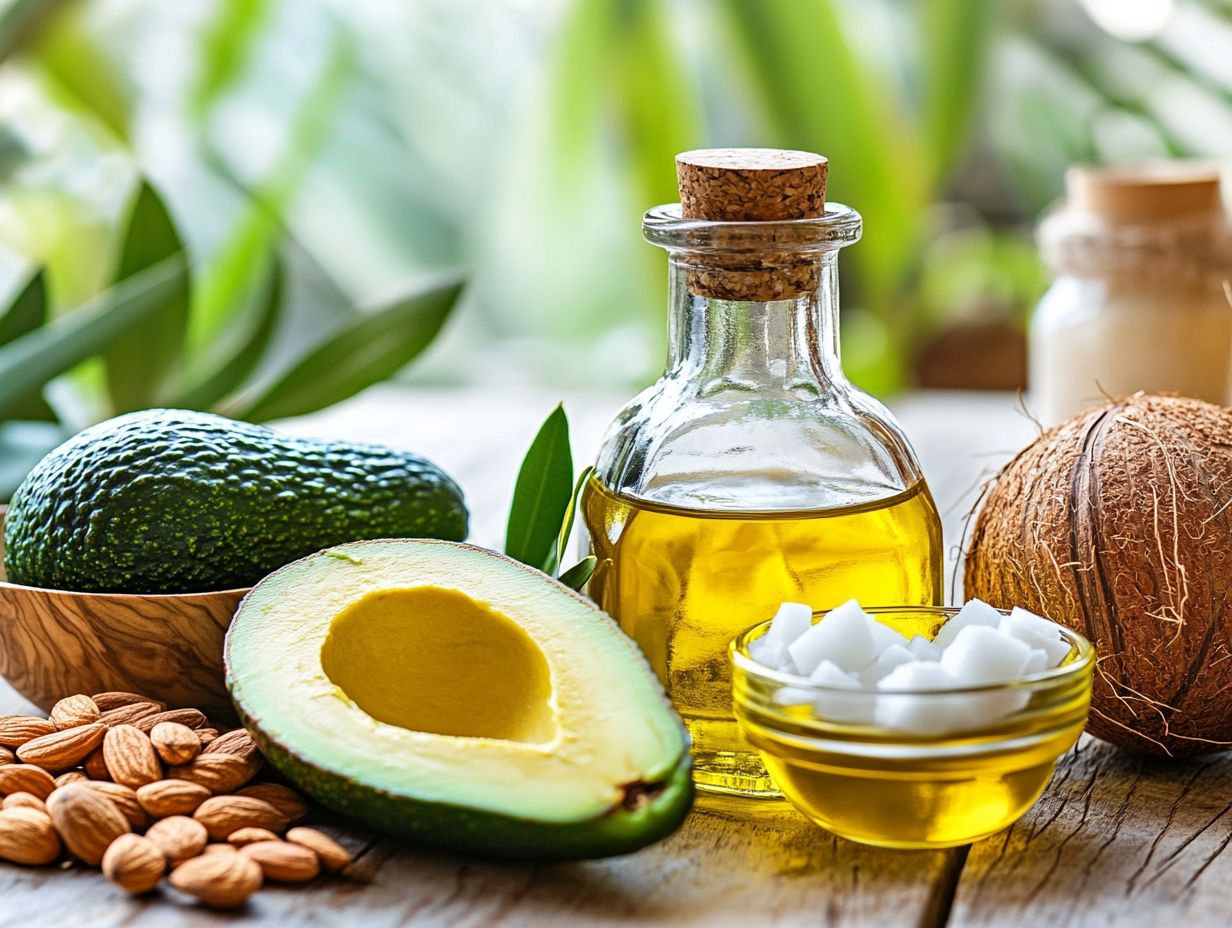
Don t miss out on the powerful benefits of adding healthy fats to every meal.
Imagine beginning your day with a luscious avocado smoothie or a breakfast burrito brimming with scrambled eggs and cheese; the possibilities to add beneficial fats are truly endless.
For lunch, picture a robust salad adorned with canned salmon, delivering essential omega-3 fatty acids, complemented by a drizzle of extra virgin olive oil and a sprinkle of nuts for that delightful crunch.
For dinner, think of baked salmon fillets slathered in pesto, paired with saut ed spinach and garlic, serving up a delicious way to meet your fat intake targets.
These culinary creations not only quell hunger but also play a vital role in sustaining your energy levels throughout the day.
4. Use Healthy Fats in Your Keto Recipes
Utilizing healthy fats in your Keto recipes can revolutionize your cooking experience, offering not only flavor and satisfaction but also the essential nutrients necessary for success on the diet. When you incorporate ingredients like coconut oil, butter, and avocado, you create rich and fulfilling meals that align perfectly with Keto principles. By planning your meals around these healthy fats, you can indulge in a variety of dishes while effectively managing your fat intake. Incorporating these fats goes beyond just enhancing flavor; it ensures your meals remain filling, which is crucial for maintaining a low-carb lifestyle. For example, a creamy avocado basil dressing can take a simple salad to new heights, ensuring you savor both taste and nutrition.
Adapting traditional recipes is a breeze. Try swapping out regular pasta for zucchini noodles or using almond flour instead of wheat flour in your baking. These changes can significantly reduce carbs while preserving the beloved flavors you enjoy.
Meal planning is essential. By batch-cooking Keto-friendly dishes, you ll always have satisfying options ready, making it easier to stick to your dietary goals and sidestep any temptation to stray.
Frequently Asked Questions
What are fats and why are they essential for a keto diet?
Fats are one of the three macronutrients, along with carbohydrates and proteins. They are essential for a keto diet because they provide the majority of the energy needed to sustain the body while in a state of ketosis, a metabolic state where fat becomes the primary source of fuel.
How do fats fit into a keto diet?
In a keto diet, fats should make up about 75% of your daily calorie intake. This is because the main goal of a keto diet is to switch the body’s primary source of fuel from carbohydrates to fats.
What types of fats are allowed on a keto diet?
Healthy, natural fats such as avocado, olive oil, coconut oil, grass-fed butter, and fatty fish are all allowed on a keto diet. Trans fats and highly processed vegetable oils should be avoided as they can increase inflammation in the body, as emphasized by the American Heart Association.
Can I eat unlimited amounts of fats on a keto diet?
No, while fats are an important part of a keto diet, it’s still important to practice portion control and not overconsume. Eating too many calories, even from healthy fats, can hinder weight loss on a keto diet.
What are the benefits of adding healthy fats to my diet?
In addition to providing energy and promoting weight loss, healthy fats can also help improve overall heart health, reduce inflammation, and support brain function. Experts like Kendra Whitmire often highlight the importance of these benefits for long-term wellness.
Are all fats created equal?
No, not all fats are created equal. Saturated and monounsaturated fats are considered healthy and should make up the majority of your fat intake on a keto diet. On the other hand, trans fats and highly processed vegetable oils should be limited or avoided altogether. Nutrition experts such as Scott Keatley and the American Heart Association agree on the importance of choosing the right kind of fats for your overall health.


